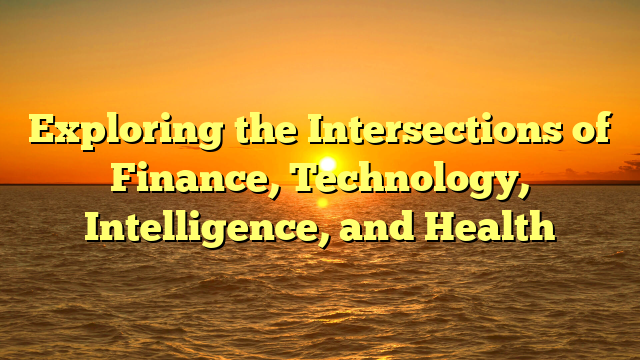—
In the modern world, four key domains play a crucial role in shaping our future: finance, technology, intelligence, and health. These areas are deeply interconnected, influencing and transforming each other. As we move further into the 21st century, their impact on our lives and societies is becoming more profound. This article explores the current trends, challenges, and innovations in these sectors, providing a comprehensive outlook on how they are evolving and intersecting.
Finance: The Changing Landscape of Global Economies
Finance has experienced profound shifts over the last few years. Technological advancements such as blockchain, digital currencies, and AI-driven analytics have disrupted traditional financial systems. Decentralized finance (DeFi) has emerged as a powerful force, offering new ways for individuals and institutions to access financial services and invest in global markets.
Moreover, financial technology (fintech) is revolutionizing the way we interact with money. Online banking, mobile payment systems, and peer-to-peer lending platforms have made financial services more accessible than ever. These advancements have led to the rise of digital banks, which operate without the need for physical branches. Additionally, the democratization of investment through apps like Robinhood has made stock trading more accessible to the general public.
Technology: The Catalyst for Change
Technology is at the core of progress in finance, intelligence, and health. The application of AI, machine learning, and data analytics is transforming the way industries operate. In finance, technology is enhancing risk management, improving decision-making, and fostering innovation. Healthcare is experiencing a similar transformation, with AI being used to optimize patient care and predict outcomes. The influence of technology continues to expand, reshaping nearly every aspect of society.
The advent of cloud computing has revolutionized data storage and processing, providing businesses with the tools to make more informed decisions. In paus138 link login , this technology is helping companies manage vast amounts of data, analyze trends, and develop predictive models. In healthcare, the cloud is improving communication among professionals and enabling more personalized treatments for patients.
Intelligence: The Role of Artificial Intelligence in Shaping the Future
Artificial intelligence (AI) is rapidly becoming one of the most influential technologies of the 21st century. In finance, AI is used to create algorithmic trading systems, assess risks, and detect fraud. By processing vast amounts of data, AI can predict market trends and optimize investment strategies. In healthcare, AI-powered systems are revolutionizing diagnostics and treatment plans, helping doctors make more informed decisions. Additionally, AI is enhancing the personalization of healthcare by tailoring treatments to individual patients based on their genetic makeup.
However, the widespread use of AI raises ethical concerns, particularly regarding privacy, job displacement, and biases in algorithmic decision-making. As AI becomes more prevalent, there is a growing need for regulatory frameworks to ensure that these technologies are used responsibly and ethically. It is essential for policymakers to address these challenges while harnessing AI’s potential to drive innovation and improve quality of life.
Health: The Intersection of Technology and Well-being
Health and technology are increasingly intertwined, particularly in the realms of personalized medicine and wellness. Advances in genetic research, along with the use of AI and big data, are enabling more personalized and targeted treatments. Precision medicine, which tailors medical treatments to individuals based on their genetic information, is becoming a reality. Additionally, wearable health devices like smartwatches and fitness trackers are helping individuals monitor their health in real-time, providing valuable insights into their physical well-being.
Moreover, telemedicine has become an essential tool in improving access to healthcare. The rise of virtual consultations, especially during the COVID-19 pandemic, has made healthcare more accessible for individuals in remote areas or those with mobility challenges. Telemedicine platforms allow patients to consult with healthcare providers from the comfort of their homes, reducing travel time and improving efficiency in healthcare delivery.
—
In conclusion, the intersection of finance, technology, intelligence, and health is creating a new wave of innovation and opportunities. As these domains continue to evolve, their impact will shape the way we live, work, and interact with one another. The future promises an exciting blend of advancements that will enhance the quality of life for individuals around the world.
